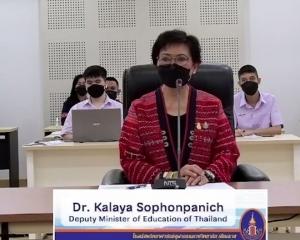Minister of Education Anne Tolley had until this week hunkered down for the long game over the implementation of National Standards.
However long it took for critics in the education sector to accept they were here to stay, or whatever criticisms they might have had of the design of the project, was beside the point.
The National Party had signalled their introduction during the 2008 election campaign, been elected with a mandate and were making good on a well-flagged promise: to address the long tail of woeful underachievement, particularly in numeracy and literacy, that encompassed up to 20% - so it has been claimed - of pupils in our primary and intermediate schools.
It was the role of the Government to direct policy formulation, and that of public servants, such as teachers and principals to implement it.
And it was in this tone that Mrs Tolley, unmoving and unmoved, conducted a series of long-running, increasingly acrimonious rallies with vocal opponents from the baseline.
Unsurprisingly, an impasse had been reached - a noisy and unsettling one impacting on the lives and expectations of a high proportion of the population: all those parents with primary and intermediate school-age pupils, caught between "policy" on one hand and classroom reality and playground politics on the other, and not quite knowing which way to turn.
Standards in primary and intermediate schools do need to be addressed.
It is imperative we have an education system effective in raising achievement and overall learning goals from the earliest of ages.
Increasingly, research indicates how critical the early years are in establishing a sound base for future learning.
Mrs Tolley and her Government have a strong case to argue in this respect.
Few of the many opponents within various levels of the educational establishment - including the unions, principals' federations, boards of trustees and academics - would appear to disagree.
Where the argument lies is in how to meet those goals.
The state of disrepair between the minister and her constituency which, after all, includes all those who work in and, in many cases have devoted their lives to, education, has made progress difficult.
Something had to be done, and Mrs Tolley's change of tack could perhaps prove a welcome circuit breaker: she has this week announced she will establish a National Standards advisory group.
It will be made up of representatives from organisations such as the New Zealand Educational Institute (the primary teachers' union), the New Zealand School Trustees Association, the New Zealand Principals Federation and a number of independent practitioners.
It will give the education sector a formal avenue through which to air concerns about the standards, their design and implementation - an outcome which teachers and others say they have been requesting since the introduction of the standards was first mooted.
While the move could be construed as a backdown by the minister, it may well be a constructive way forward.
Those who would appear to remain implacably opposed to the very notion of standards may have been wrong-footed by the conciliatory volley.
The hurdles are not all cleared, but the way is now open for the involvement of all sides in achieving a standards-based system which raises the learning capacities of the poorly performing while not hindering or slowing down those of the more able.
Integrating standards with the new curriculum, streamlining design so that a minimum of crucial teaching time is lost in their delivery, and crucially, obtaining the input of teachers themselves - often the result of trial and error at the chalkface - now begins to seem possible.
At a stroke, many of the objections of Mrs Tolley's critics are neutralised.
That it has taken so long to arrive at this point has its costs: to teachers in the classroom and to pupils and their parents effectively trialling a system that many have been concerned about.
But also, undoubtedly to the esprit de corps of the education sector, much of which has found itself at odds with its political leadership.
There are faults, and lessons to be learned, on all sides.
Their obstinacy and resistance will not have reflected well on some teachers and principals.
Likewise, Mrs Tolley might wish to reflect on her own style of "leadership" and of the need to persuade rather than simply command.
Regardless, it is to be hoped that for the sake of children and their parents, this move results in a genuine meeting of minds and real improvements in the country's primary-school education.











